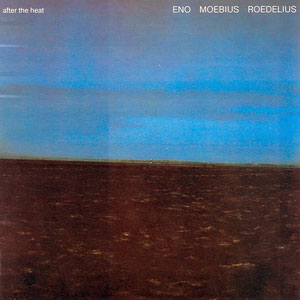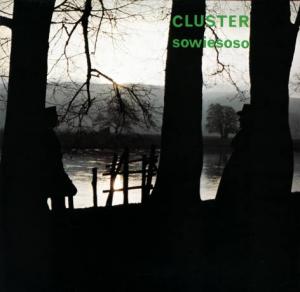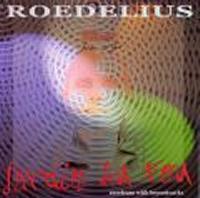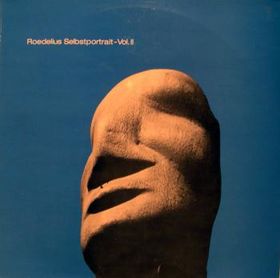
Konrad "Conny" Plank was a German record producer and musician. He is known for his innovative work as a sound engineer and producer in Germany's krautrock and kosmische music scene in the 1970s. Plank was involved in releases by Neu!, Kraftwerk, Cluster, Harmonia, Ash Ra Tempel, Guru Guru, Kraan, and other German groups of the era. He later produced for new wave acts such as D.A.F., Eurythmics and Ultravox. As a billed performer, Plank also formed the group Moebius & Plank, releasing 5 albums between 1979 and 1986.

Cluster & Eno is a collaborative album by German electronic music group Cluster and English ambient musician Brian Eno. The style of this album is a collection of gentle melodies: a mixture of Eno's ambient sensibilities and Cluster's avant-garde style.

Cluster were a German musical duo consisting of Hans-Joachim Roedelius and Dieter Moebius, formed in 1971 and associated with West Germany's krautrock and kosmische music scenes. Born from the earlier Berlin-based group Kluster, they relocated in 1971 into the countryside village of Forst, Lower Saxony, where they built a studio and collaborated with musicians such as Conny Plank, Brian Eno, and Michael Rother; with the latter, they formed the influential side-project Harmonia. After first disbanding in 1981, Cluster reunited several times: from 1989 to 1997, and from 2007 to 2010.

After the Heat is a 1978 album by Brian Eno, Dieter Moebius and Hans-Joachim Roedelius, credited to "Eno Moebius Roedelius". The album represents the second collaboration by the trio, the first being 1977's Cluster & Eno. As with the previous album, After the Heat was created in collaboration with the influential krautrock producer Conny Plank.

Begegnungen is a Sky Records 1984 collection of music by Brian Eno, Dieter Moebius, Hans-Joachim Roedelius and Conny Plank, compiled from these seven solo and collaborative albums released by Sky between 1976 and 1983:

Begegnungen II is a Sky Records 1985 compilation album with recordings by Brian Eno, Dieter Moebius, Hans-Joachim Roedelius, Conny Plank, Cluster, from solo albums, and from various collaborations between the artists. All of the tracks had been previously released elsewhere. The albums these tracks were drawn from are: Material by Moebius & Plank, Zero Set by Moebius, Plank, Neumeier, Durch Die Wuste and Lustwandel, both Roedelius solo albums, After The Heat by Eno, Moebius, Roedelius, Tonspuren, the first solo album by Moebius, Sowiesoso by Cluster, and the eponymous Cluster & Eno. These albums were released by Sky between 1976 and 1983.

Großes Wasser is the seventh album by the electronic music outfit Cluster. It was co-produced by former Tangerine Dream member Peter Baumann. Großes Wasser marked the return to Cluster working as a duo of Hans-Joachim Roedelius and Dieter Moebius after two albums collaborating with Brian Eno.

Hans-Joachim Roedelius is a German electronic musician and composer, known as a co-founder of the influential 'kosmische' groups Cluster and Harmonia. He is notable for his prolific discography, either as a solo artist, as part of a band, or in collaboration with other artists. He has more than 100 releases to his name. He also performed in the ambient jazz trio Aquarello, and released several solo studio albums.

Sowiesoso is the fourth studio album by German electronic music band Cluster, released in 1976. It was Cluster's first release for Sky Records. Sowiesoso was recorded in just two days in Forst, Germany in 1976 and mixed at Conny's Studio in Wolperath.

Musik von Harmonia is the debut album from the influential German krautrock group Harmonia, released in January 1974 by Brain Records. Formed by the addition of Neu! guitarist Michael Rother to Cluster, they recorded the album from June to November 1973 in Cluster's Forst recording studio. It was self-produced by the group using a primitive mixer and three tape recorders.
Moebius & Plank was a German electronic music duo consisting of musicians Dieter Moebius and Conny Plank. They recorded three albums between 1979 and 1986 as well as two additional albums, one a collaboration with Mani Neumeier and the other with Mayo Thompson. Plank died of cancer in 1987. Their final two albums were released posthumously in 1995 and 1998 respectively

Durch die Wüste is the first full-length solo album by German keyboardist Hans-Joachim Roedelius, best known for his work with Cluster, Harmonia, and Aquarello. The title is German for "Through the Desert."

Jardin Au Fou is the second solo album by German keyboardist Hans-Joachim Roedelius, best known for his work with Cluster. The title is French for "Madman's Garden".

Selbstportrait is the third solo album by German keyboardist Hans-Joachim Roedelius, best known for his work with Cluster, Harmonia, and Aquarello. The title is German for "Self Portrait", a title meant to reflect the gentle, introspective nature of the ambient and new-age music of the album. The original Sky Records release was subtitled Teil 1 Sanfte Musik, German for "Part 1, Soft Music."

Selbstportrait – Vol. II is the fourth solo album by German keyboardist Hans-Joachim Roedelius, best known for his work with Cluster, Harmonia and Aquarello. The title is German for "Self Portrait - Vol. II", a title which clearly reflects the gentle, introspective nature of this album of ambient or new-age music. It is the second of seven albums in Roedelius' Selbsportrait series of recordings. The album is subtitled "Freundliche Musik", German for "Friendly Music".

Lustwandel is the sixth solo album by German keyboardist Hans-Joachim Roedelius, best known for his work with Cluster, Harmonia, and Aquarello. All the pieces on the album were composed by Roedelius with the sole exception of "Wilkommen", which was composed by Roedelius and Will Roper. It was released by Sky Records in 1981 and has been reissued on CD by Sky Records in Germany in 1992 and by the Gyroscope label in the United States in 1996.

Offene Türen is the eighth solo album by German keyboardist Hans-Joachim Roedelius, best known for his work with Cluster, Harmonia, and Aquarello. The music of Offene Türen is more avant-garde than other Roedelius solo albums of the 1970s and 1980s. It can best be compared to Cluster's Curiosum which was released by Sky Records the previous year.

Wenn Der Südwind Weht is the seventh solo album by German keyboardist Hans-Joachim Roedelius, best known for his work with Cluster, Harmonia, and Aquarello. All the pieces on the album were composed by Roedelius. It was released by Sky Records in 1981 and has been reissued on CD by Sky Records in Germany by the Gyroscope label in the United States in 1996. The Bureau-B label reissued Wenn Der Südwind Weht in the European Union on both CD and 180 gram vinyl LP in 2010.

Flieg' Vogel fliege is the ninth solo album by keyboardist Hans-Joachim Roedelius, best known for his work with Cluster, Harmonia, and Aquarello. According to Roedelius biographer Stephen Iliffe this album is also titled Selbstportrait IV, but that name does not appear on the album sleeve or label. Flieg' Vogel fliege was recorded at Roedelius' home studio and completed at Erpelstudio, Vienna, Austria. Flieg' Vogel fliege was released by Sky Records on vinyl in 1982. Flieg' Vogel fliege was the final album Roedelius recorded for Sky Records.

Auf leisen Sohlen is a compilation by Sky Records of works by German keyboardist Hans-Joachim Roedelius, best known for his work with Cluster, Harmonia, and Aquarello. It is subtitled Das Beste von H. J. Roedelius and includes tracks from seven of the eight albums he recorded for Sky Records during that period. All music included in this collection was composed by Hans-Joachim Roedelius.



















